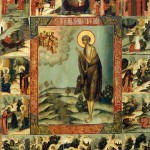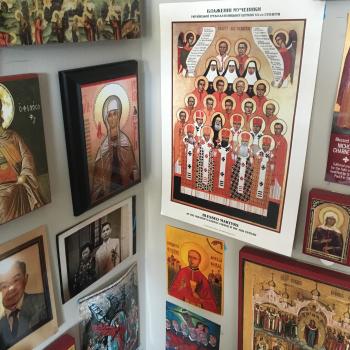![Musée d'art et d'histoire de Genève - by Sailko, 20 May 2014 (Creta_o_venezia,_madonna_glykophilousa,_1457.jpg) (CC BY 3.0 [https://creativecommons.org/licenses/by/3.0/deed.en]), via Wikimedia Commons](https://wp-media.patheos.com/blogs/sites/721/2017/04/Creta_o_venezia_madonna_glykophilousa_1457-835x1024.jpg)
Many thoughts swirled through my mind while I was singing the Akathist, perhaps yet another indicator that I am a terrible hesychast. For one, I love how this Akathist is simply called the Akathist Hymn, the original no-sitting hymn, sometimes ascribed to Holy Roman the Melodist, the hymnwriter of sixth-century Constantinople whose icon was on the deacon door at the temple where I became Eastern Catholic. Although no one is really sure if Holy Roman the Melodist actually wrote the hymn (there seem to be many other contenders for authorship), his story also reminds me of one of my favourite songwriters from when I was an Anglican: Cædmon. Both of these hymn-writers couldn’t sing for the life of them until they were mysteriously and supernaturally given the gift of song. Cædmon ended up writing a bunch of songs from Scripture, including the famous Cædmon’s hymn singing of creation, from which I am pretty certain another author with the surname of Tolkien got some ideas:
Now [we] must honour the guardian of heaven,the might of the architect, and his purpose,the work of the father of glory as he, the eternal lord, established the beginning of wonders;he first created for the children of men heaven as a roof, the holy creator. Then the guardian of mankind,the eternal lord, afterwards appointed the middle earth,the lands for men, the Lord almighty.
For Holy Roman the Melodist’s part, he composed a bunch of hymns known as the kontakia. Perhaps I will begin venerating both together. After all, after leaving Anglicanism, I still miss Julian of Norwich, and I’ll probably include her on my list for veneration in the near future as well.
One of the more famous Kondak Hymns was written after the time of Holy Roman the Melodist. After the Siege of Constantinople in 626, Byzantine Christians began venerating the Most Holy Theotokos as their ‘Champion Leader’ for delivering the city from destruction, and this was included as the Kondak to the Theotokos in the Akathist:
To thee, the Champion Leader, we thy servants dedicate a feast of victory and of thanksgiving as ones rescued out of sufferings, O Theotokos; but as thou art one with might which is invincible, from all dangers that can be do thou deliver us, that we may cry to thee: Rejoice, thou Bride Unwedded!
As I sang this hymn – a song that is familiar for me because it’s included in the Jordanville Prayer Book’s ‘Prayers Before Sleep’ – I thought of the time that I visited St Elias’ Church in Brampton, Ontario, when the Patriarch came from Kyiv to consecrate their rebuilt temple (it had burned down in 2014). The Patriarch recounted during his homily how he had come when the temple had first burned to the ground, promising Fr Roman Galadza and his people that he’d come back to consecrate the rebuilt temple. He told us that while that was what he said, he wasn’t in fact sure at the time if he could keep his promise. After all, in 2014, right off the heels of the Revolution of Dignity, Russia had invaded Crimea and a hybrid war of both misinformation and physical invasion had begun in Eastern Ukraine. The Patriarch admitted that there was a chance that he himself could have been killed in the crossfire upon return to Ukraine. But then he said that he remembered the Oranta of Kyiv, the Theotokos standing in St Sophia Cathedral with her hands lifted up in prayer. It is said, he told us, that she is the ‘Immovable Wall,’ the defender of Kyiv, that as long as she stands in prayer with her hands lifted up, the city will not be taken. Our Champion Leader is the rescuer of the holy city of Constantinople, the Immovable Wall of the holy city of Kyiv, the Mother who brought our Patriarch back from Kyiv despite the war so that he could consecrate St Elias Church in Brampton.
The Akathist Hymn moves through the stories that are familiar to us: the Annunciation of the angel Gabriel to the Theotokos that she would bear the Lord in her womb, the Visitation of the Theotokos to Elizabeth, Holy Joseph the Betrothed learning how it was that his Virgin Bride had become pregnant, the shepherds bearing witness to the Nativity of our Lord Jesus Christ, the Epiphany of the Lord to the Magi, the Presentation of the Lord in the temple during which Symeon recognized the Lord and sang his song. All of these I felt as gifts that were returned to me; prior to becoming an Eastern Catholic catechumen, I had prayed the rosary regularly and loved especially the Joyful Mysteries. It was not because I became an Eastern Catholic catechumen that I stopped praying the rosary; instead, it was because I admitted to the priest who became my spiritual father that the rosary was presenting me with difficulty as I found it a bit too busy as I juxtaposed reciting the ‘Hail Mary’ while pondering the mysteries – he advised me to stop and to explore different modes of prayer. In the Akathist, I am given back some of my favourite scenes from the Rosary with verses perhaps written by Holy Roman the Melodist; because of this, I am ecstatic.
But the set of verses that struck me the most was the ninth oikos (the ninth ‘house’ of verses). Here it is in full:
We see most eloquent orators mute as fish before thee, O Theotokos, for they are at a loss to tell how thou remainest a Virgin and couldst bear a child. But we, marvelling at this mystery, cry out faithfully:
Rejoice, receptacle of the Wisdom of God!
Rejoice, treasury of His Providence!
Rejoice, thou who showest philosophers to be fools!
Rejoice, thou who exposest the learned as irrational!
Rejoice, for the clever critics have become foolish!
Rejoice, for the writers of the myths have faded away!
Rejoice, thou who didst rend the webs of the Athenians!
Rejoice, thou who didst fill the nets of the fishermen!
Rejoice, thou who drawest us from the depths of ignorance!
Rejoice, thou who enlightenest many with knowledge!
Rejoice, ship for those who wish to be saved!
Rejoice, harbor for sailors on the sea of life!
Rejoice, thou Bride Unwedded!
As I sang these verses, I felt very moved, and upon reflection, I realize that it is perhaps these verses that speak to some of my reflections during this Great Fast. I have been mulling over the bodily practice of hesychasm is, how it is different from sloth, and what it may have to do with what I’ve called ‘intellectual chastity,’ the tempering of the mind (the nous) by bringing it into the heart. At the same time, I have been reflecting on the power of the Spirit to bring about the restoration of the Christian ecumene, even as I write about sisters and brothers in my Protestant past as part of the exercise of reliving my catechumenate. Here, all of those thoughts about so many topics find their focus in the figure of the Theotokos, the Unwedded Bride whose bearing of G-d in her womb without seed confounds the wisest of us.
The Theotokos is thus my Champion Leader because she is, in the words of the Holy Pope John Paul II, ‘the one who advanced on the pilgrimage of faith, sharing unlike any other creature in the mystery of Christ’ (Redemptoris Mater, 25). In her stillness, it is she who ponders in her heart the Joyful Mysteries, and whether it was in the Rosary of my Anglo-Catholic past that eventually tired me out or it is in the Akathist of my Eastern Catholic present that has flooded me with reflections today, I still approach her as a child to ask: Mother, what are you thinking about? What is this that you ponder in your heart? Seldom do I get a reply – she is, after all, in stillness, pondering in silence – but it is perhaps her stillness and silence that is the answer, turning my intellect to mush as I stand beside her in prayer.
In this way, the cry of Rejoice, thou Bride Unwedded! is an ecstatic cry, the ek-stasis (as the Greek theologian Christos Yanarras, among others, points out) that means to literally stand out, to come out of myself in desire for the other, the desire that the Theotokos who is not me would rejoice. In the ecstatic cry for her to rejoice, she covers me with her maphorion, her protecting veil, as the material form of her protection, just as she did for Constantinople, for Kyiv, for St Elias Brampton. There is a diversity of cities here, with the added humor that it it seems to have been the Rus’ of Kyiv who most frequently attacked Constantinople before the baptism of Volodymyr Equal-to-the-Apostles, and that it would have therefore been against the pagan ancestors of our church that the protection of the Champion Leader was most frequently invoked. If this is the case, then the protecting veil also is a protection against being entrenched in the identity of the city in which I was saved. I am a Christian in the Church of Kyiv now, but this is not to deny my Protestant past or the saints like Cædmon and Julian of Norwich who walked with me in the Anglican Communion (and with whom I am still in communion, as they are saints now venerated in the Church of Rome). No, as I said in another post, the Theotokos came to me through the Word, through the reflection of the Word that G-d does to us: fiat mihi secundum verbum tuum.
In my ecstasy, let me be still, Most Holy Theotokos. Cover me with your maphorion, and save us as we sing, Rejoice, thou Bride Unwedded!
















